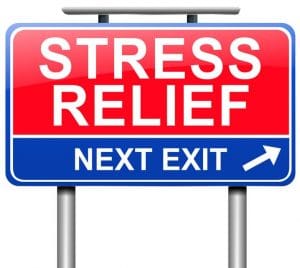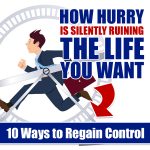
When you feel stress about performing an upcoming task, how can you find stress relief by reducing your anxiety levels?
Here’s why this is crucial: If you don’t reduce your anxiety, it will almost certainly impact your performance… potentially leading to a self-fulfilling prophecy – things didn’t turn out well, just like you were worried about in the first place.
Researchers at Michigan State University discovered a simple technique that measurably reduces your anxiety levels, allowing you to perform without the crippling effects of the anxiety.
I believe this technique has broader application for the anxiety and stress you face in your life (not just for an upcoming task).
I use it every day, and I can attest to its power to release much of the anxiety you unnecessarily carry around with yourself.
What Researchers Tested
The research study conducted at Michigan State, and funded by the National Science Foundation, identified students who were “chronically anxious individuals” and ran them through a series of tests.

They split this test group into an experimental group and a control group. Prior to doing the task that made participants anxious, the groups were asked to do some reflective or expressive writing for approximately 8 minutes:
- The experimental group wrote about how they felt about the upcoming task.
- The control group wrote about what they did the day before.
Then, while conducting the task, both groups of participants were monitored with an electroencephalography, or EEG.
What happened next was a little surprising. You would think focusing on and writing about how you felt facing the anxiety producing task would make you MORE anxious.
That didn’t happen.
What Normally Happens in the Anxious Brain
Normally in the mind of someone who is very anxious while performing some task (think: presenting your invention in front of Shark Tank investors), the brain is actively processing the presentation AND processing the anxiety associated with the task.
performing some task (think: presenting your invention in front of Shark Tank investors), the brain is actively processing the presentation AND processing the anxiety associated with the task.
As researchers reported:
“Worrying takes up cognitive resources. It’s kind of like people who struggle with worry are constantly multitasking — they are doing one task [while at the same time in the background of their mind] trying to handle and suppress their worries, too.”
Is it any wonder why you can’t perform as well at a task?
The Research Discovery
What researchers actually found was fascinating and conclusive.
“Our findings show that if you get these worries out of your head through expressive writing [expressing how you were feeling about the task], those cognitive resources are freed up to work toward the task you’re completing and you become more efficient.”
In other words, they used fewer brain resources to accomplish the task. The analogy the researchers used to explain the resultant brain efficiency:
“Worried college students who wrote about their worries were able to offload these worries and run more like a brand new fuel efficient Toyota Prius.”
“The worried students who didn’t offload their worries ran more like a ’74 Impala — guzzling more brain gas to achieve the same outcomes on the task.”
How to Use This Technique to Reduce Anxiety
I believe you can apply the principle of “expressive writing” (I’ll call it journaling) to reduce the effects of overall anxiety in your daily life (not just for a specific task coming up).
This can be pen/paper, typing into a computer, even speaking into voice recognition software.
Here are 5 best practices on how to apply this technique:
- What you write about- You don’t need to limit yourself to upcoming events that are stressing you out. Anything that is weighing on you or burdening you is using up your brain’s limited resources, leaving less available to focus fully on the day in front of you.
- How often you express– Since every day you and I have things in our lives that are weighing on us, making us anxious, or frustrated, or in some way impacting us, it is a good idea to journal for a few minutes every day. Isn’t a 10 minute investment worth a better day?
- Be honest– Journalism allows you to say anything, with full honesty, and not sugar coat it to appear more in control than you really are. So, be honest. Say what you are really feeling and express it to your journal.
- Talk back: I find it helpful to take my expressive journalism a step further, for greater effect. Instead of just expressing, which lets your thoughts and feelings have the final word, also include some dialog where you speak to yourself the way you would speak to someone else if they were expressing their thoughts to you.When you talk to yourself instead of just listening to or expressing yourself, you are able to change how you think about a situation (click the link to read more about how to do this). When you speak truth to yourself in addition to being honest about what you are feeling, there is a powerful effect on how you feel moving forward.
- Talk to someone: This one is a little trickier, but very powerful. Expressive writing to no one in particular is good, but expressing yourself to the right person can take the effect to a whole new level.The challenge? Finding the right person.
Usually, that is someone who won’t judge you, or tell you why you shouldn’t feel that way, or try to fix you instead of really listening. What you need is someone who is empathetic, compassionate, understanding, a good listener, who gently offers wisdom/insight and encouragement (at the proper time) that can help.
If you can find someone like this, you are very fortunate. It can make a big difference.For me, that person is Jesus (including the other members of the trinity). He perfectly fits the description of the right person who understands, cares and is wise. Better still… he can actually help!
Note: if you are not a person of faith, you can still use this technique with a person you know.
Here’s how I do it: When I journal in the mornings (or go on a walk to process my feelings), I find it helpful to tell God what is going on inside of me and seek wisdom to counteract my fears and worries.
God doesn’t listen grudgingly. He invites us to cast all our cares on him, and not to be anxious about anything but to pray about everything. Once I have released my burdens to him (not a one-time act, but a daily, sometimes hourly need), I am now free(r) to face the day.
Does this technique completely eliminate anxiety and stress in your life? Unfortunately, there is no magic pill that consistently erases those anxious feelings. But, it does help lighten the load and free me up to be my best.
Your Turn!
How have you handled the anxiety producing situations of your life? Leave a comment below with YOUR best tips.










Fantastic advice, simple yet effective. Thanks
This is some great advice. Writing really helps me a lot in framing how I view things. Often when I write, I see things in a whole new way. However, I didn’t think about writing this out before I encounter some of those “anxiety” moments of things I need to do. So, I’m going to try that next time!
Thanks Don for the comment. I agree with you that writing/journaling has many benefits. Regarding the emphasis of this article, I think if you combine writing/journaling with visualization it can really help prepare you for the anxious moment you might or will face.